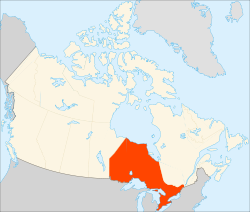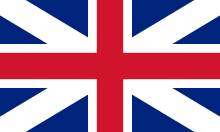Portal:Ontario
The Ontario Portal


Ontario (/ɒnˈtɛərioʊ/ on-TAIR-ee-oh; French: [ɔ̃taʁjo]) is the southernmost province of Canada. Located in Central Canada, Ontario is the country's most populous province. As of the 2021 Canadian census, it is home to 38.5 percent of the country's population, and is the second-largest province by total area (after Quebec). Ontario is Canada's fourth-largest jurisdiction in total area of all the Canadian provinces and territories. It is home to the nation's capital, Ottawa, and its most populous city, Toronto, which is Ontario's provincial capital.
Ontario is bordered by the province of Manitoba to the west, Hudson Bay and James Bay to the north, and Quebec to the east and northeast. To the south, it is bordered by the U.S. states of (from west to east) Minnesota, Michigan, Ohio, Pennsylvania, and New York. Almost all of Ontario's 2,700 km (1,700 mi) border with the United States follows rivers and lakes: from the westerly Lake of the Woods, eastward along the major rivers and lakes of the Great Lakes/Saint Lawrence River drainage system. There is only about 1 km (5⁄8 mi) of actual land border, made up of portages including Height of Land Portage on the Minnesota border.
The great majority of Ontario's population and arable land is in Southern Ontario, and while agriculture remains a significant industry, the region's economy depends highly on manufacturing. In contrast, Northern Ontario is sparsely populated with cold winters and heavy forestation, with mining and forestry making up the region's major industries. (Full article...)
Selected article -

The Province of Upper Canada (French: province du Haut-Canada) was a part of British Canada established in 1791 by the Kingdom of Great Britain, to govern the central third of the lands in British North America, formerly part of the Province of Quebec since 1763. Upper Canada included all of modern-day Southern Ontario and all those areas of Northern Ontario in the Pays d'en Haut which had formed part of New France, essentially the watersheds of the Ottawa River or Lakes Huron and Superior, excluding any lands within the watershed of Hudson Bay. The "upper" prefix in the name reflects its geographic position along the Great Lakes, mostly above the headwaters of the Saint Lawrence River, contrasted with Lower Canada (present-day Quebec) to the northeast.
Upper Canada was the primary destination of Loyalist refugees and settlers from the United States after the American Revolution, who often were granted land to settle in Upper Canada. Already populated by Indigenous peoples, land for settlement in Upper Canada was made by treaties between the new British government and the Indigenous, exchanging land for one-time payments or annuities. The new province was characterized by its British way of life, including bicameral parliament and separate civil and criminal law, rather than mixed as in Lower Canada or elsewhere in the British Empire. The division was created to ensure the exercise of the same rights and privileges enjoyed by loyal subjects elsewhere in the North American colonies. In 1812, war broke out between Great Britain and the United States, leading to several battles in Upper Canada. The United States attempted to capture Upper Canada, but the war ended with the situation unchanged.
The government of the colony came to be dominated by a small group of persons, known as the "Family Compact", who held most of the top positions in the Legislative Council and appointed officials. In 1837, an unsuccessful rebellion attempted to overthrow the undemocratic system. Representative government would be established in the 1840s. Upper Canada existed from its establishment on 26 December 1791 to 10 February 1841, when it was united with adjacent Lower Canada to form the Province of Canada. (Full article...)General images
Surrounding areas
Selected biography -

Arthur Albert Irwin (February 14, 1858 – July 16, 1921), nicknamed "Doc", "Sandy", "Cutrate" or "Foxy", was a Canadian-American shortstop and manager in Major League Baseball (MLB) during the late nineteenth century. He played regularly in the major leagues for eleven years, spending two of those seasons as a player-manager. He played on the 1884 Providence Grays team which won the first interleague series to decide the world champions of baseball. Irwin then served as a major league manager for several years.
Irwin occupied numerous baseball roles in the latter years of his career, having spent time as a college baseball coach, a major league scout and business manager, a minor league owner and manager, and a National League umpire. For most of Irwin's career, the collegiate and professional baseball schedules allowed him to hold positions at both levels in the same year. (Full article...)Selected image
Did you know? -
- ... that in 1987, Royal Society of Canada fellow Kathryn Brush was one of the first women to be hired for a full-time position in art history at the University of Western Ontario?
Related projects and portals
Topics
Categories
Things you can do
- Help expand stub articles: There are numerous stub articles relating to Ontario. You can help by expanding them. See Ontario stubs for a list. Also, for geographical (places) stubs, refer to:
- Eastern Ontario: Eastern Ontario geography stubs
- Toronto: Toronto geography stubs
- Ottawa: Ottawa stubs - All stubs relating to Ottawa in general
- Northern Ontario: Northern Ontario geography stubs
- Western Ontario: Western Ontario geography stubs
- Golden Horseshoe: Golden Horseshoe geography stubs
Associated Wikimedia -
The following Wikimedia Foundation sister projects provide more on this subject:
-
Commons
Free media repository -
Wikibooks
Free textbooks and manuals -
Wikidata
Free knowledge base -
Wikinews
Free-content news -
Wikiquote
Collection of quotations -
Wikisource
Free-content library -
Wikiversity
Free learning tools -
Wikivoyage
Free travel guide -
Wiktionary
Dictionary and thesaurus





































